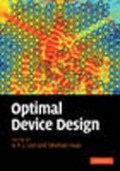
Explore the frontier of device engineering by applying optimization to nanoscience and device design. This cutting-edge work shows how robust, manufacturable designs that meet previously unobtainable system specifications can be created using a combination of modern computer power, adaptive algorithms, and realistic device-physics models. Applying this method to nanoscience is a path tocreating new devices with new functionality, and it could be the key design element in making nanoscience a practical technology. Basic introductory examples along with MATLAB code are included, through to more formal and sophisticated approaches, and specific applications and designs are examined. Essential reading for researchers and engineers in electronic devices, nanoscience, materials science, applied mathematics, and applied physics. INDICE: Preface; Acknowledgements; 1. Frontiers in device engineering Philip Seliger and A. F. J. Levi; 2. Atoms-up design Stephan Haas; 3. Electron devices and electron transport K. Magruder, Philip Seliger, and A. F. J. Levi; 4.Aperiodic dielectric design Philip Seliger; 5. Design at the classical-quantum boundary Rodrigo Muniz and Stephan Haas; 6. Robust optimization in high dimensions Omid Nohadani and Dimitris Bertsimas; 7. Mathematical framework for optimal design I. G. Rosen and C. Wang; 8. Future directions A. F. J. Levi; Appendix A; About the authors; Index
- ISBN: 978-0-521-11660-2
- Editorial: Cambridge University
- Encuadernacion: Cartoné
- Páginas: 294
- Fecha Publicación: 24/12/2009
- Nº Volúmenes: 1
- Idioma: Inglés
